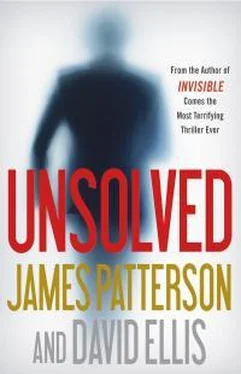It was a risk they had to take. There had been debate about when to do the op. Daytime made some sense, but two of the people living in this building work from home, so the decision was made to try to sneak in during the wee hours.
These tac-ops guys are pros. He saw them break the window of a corrupt governor’s campaign office in the middle of the night, move in, hide electronic surveillance devices, clean up the mess, replace the window, and go without leaving a trace of the operation. He watched them open a supposedly impenetrable safe-deposit box without a key in the span of sixty seconds. The greatest safecrackers and cat burglars in the world work for the Federal Bureau of Investigation. He’s always known this, but it’s somewhat unsettling now that he thinks about it as a civilian.
But those skills aren’t needed to access the condo on the second floor any more than they were needed for the front door because Books has a key for the condo too. He opens the door while one of the tac agents holds the trigger of a repressor to freeze the alarm system.
And then they are inside, all of them. The security alarm remains quiet.
The door closes. The condo is completely dark; the windows are covered by drapes that block any outside light.
They will move to an interior room, away from the front door, before turning on an overhead light. They don’t want the glow from the light bleeding into the hallway.
Flashlights go on. The beams illuminate a small kitchen, a living room. He follows the agents into one of the two bedrooms. There, one of the agents flips on a light.
Books squints for a moment. Then his eyes open fully.
There’s a part of him, if he’s honest with himself, that is not surprised at what he sees.
“Oh no,” he whispers. “Oh no, Emmy.”
12
INSIDE THE bedroom that Emmy uses as an office, the tac officers are all business. One agent photographs every single document in the room, wherever it is—on the desk, on the walls, in the file cabinets, on the floor—taking care to leave them just as they were found. Another uses a portable hard drive to download the contents of Emmy’s computers. A third installs the first of several eavesdropping devices, this one inside a carbon monoxide detector.
Books can’t take his eyes off the walls; a cold shiver runs through him.
One wall is lined with copies of dozens of letters addressed to Emmy, some handwritten, some typed:
Catch me if you can, Emmy. If you do, I’ll show you what I do with their internal organs.
I wish the rest of the cops were as smart as you and could STOP ME
IM BETTER THAN GRAM IN EVERY WAY IM SMARTER AND STRONGER AND YOULL NEVER CATCH ME AND ONE DAY I WILL COME FOR YOU AND I WONT KILL YOU UNTIL YOU BEG ME TO
On another wall, there are poster boards filled with notes in Emmy’s handwriting. One of them, titled “How to Make It Look Accidental,” has bullet points noting ways to subdue victims and stage evidence and plan escape routes. Another one lists victims’ characteristics, not just race and gender and age but also sexual preference, marital status, education, political ideology, group affiliations, criminal history, social media posts, voter registration records, driving records, military service, professional background, credit ratings, pets, allergies, hair color, weight, height—
Yet another wall is filled with newspaper articles: Suicides and drownings. Overdoses and electrocutions. Deaths determined to be due to accidental causes. The cases come from around the country, from Atlanta, Charleston, Dallas, New Orleans.
He stops on that last one. New Orleans. Someone named Nora Connolley, who apparently died recently after a fall in the shower.
New Orleans, where Emmy is right now. She told Books she was going to visit some college friends.
Books brings a hand to his face. Emmy has gone rogue again.
Another chase through thousands of cases across the nation. Another exhaustive, and exhausting, daily probe of incidents around the country—the overwhelming majority of which are noncriminal, accidental, just plain old bad luck—in search of that tiny hint that will reveal a pattern of brilliant, diabolical criminality.
He thought she was done with this. That the days of obsessively scouring the web and police databases and breaking-news e-mail blasts were behind her, that she had finally come to understand that she was not the country’s supercop, that she didn’t have to solve every problem in every jurisdiction in every state in the union. That for once, she was going to think about herself, about getting better, about moving on.
And to think about them, Emmy and Books, a couple with a future together.
Books blinks out of his trance and looks around at the agents. They continue their work, rifling through more drawers and taking more photos and planting more eavesdropping devices. They are here to find out if Emmy has been leaking confidential information on a high-profile case. They are trying to determine if she has betrayed the FBI.
Books doesn’t believe she has. Never did. The only reason he agreed to work this investigation into Emmy—the only reason—was he was sure that she’d be cleared of any wrongdoing, that the Bureau was wrong. Emmy would never betray the job, the work to which she is so devoted.
But apparently, she’s willing to betray everything and everybody to accomplish that work.
His phone buzzes in his pocket. He pulls it out and sees who’s calling. Speak of the devil.
“This is Emmy calling me,” he says to Agent Homer.
The agent looks up at him with a question on his face. Books nods. Everyone stops moving.
His chest burning, he answers the call with “Hey there.”
“Hey, hope I didn’t wake you. Whatcha up to?” The connection’s not good; Emmy sounds distant.
What am I up to? he thinks. I’m searching through your apartment, finding out that you’ve been lying to me.
“Getting ready for bed,” he says. So now he is lying too. “How’s N’awlins?” he asks.
“Fun. We’re having a good time. Just wanted to say good night and love you.”
He could press Emmy for more information. The names of the friends she claims to be visiting. The restaurant or bar or hotel she’s calling from. The places they’ve gone. But he can’t bring himself to do it. He can’t bear to hear even one more lie from his fiancée.
Instead, with four federal agents watching, feeling as if his insides are being ripped out, he says to the only woman he has ever loved, to the fiancée that he thought he understood so well: “Love you too.”
He means those words. He’s never meant them more. But saying them under these circumstances…he feels like he is lying again.
“Are we still good for tomorrow?” she asks.
That word again, good . For his homeless friend Petty, good meant a warm, safe place to sleep. What does good mean for Books? A woman he dearly loves but who cannot love him back?
“Yeah, sure, of course,” he hears himself say. “We’re always good.”
13
I SWAT at my smartphone on the nightstand of my hotel room, but the sound of harp strings won’t stop. My head feels like it weighs a hundred pounds as I lift it off the pillow and try to bring the clock into focus; strips of sunlight glare at me through the blinds.
I hit Accept. Words come through the receiver. “Hello? Emmy Dockery? Hello?”
I try to speak into the phone, but all that comes out is a gravelly growl. I clear my throat and try again.
“My name is Nadia Jacobius,” she says. “I’m a reporter with the Times-Picayune .”
But…who knows I’m here? I haven’t exactly advertised my visit. I don’t advertise anything about my whereabouts these days.
Читать дальше












